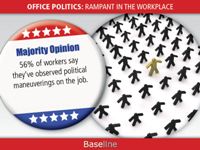Recently, I wrote about Sarah, who were back-stabbed at work and asked you what you would do if you were her. Thanks for all who voted! It was great to see many of you knew the best way to handle this unfortunate situation and protect yourself and your work reputation. Here is what Sarah actually did. All the quoted dialogue are paraphrased
Sarah did have a funny feeling about this piece of work. Usually when she delivers something that is critical to an executive presentation, she will at least get a few more questions and will hear how the presentation went. She heard neither, so before the surprised outburst from Steve, Margaret’s boss, Sarah did go back to her own team to inquire if anyone heard anything and go over with everyone again the sequence of events of how they worked together with Margaret.
Sarah was however shocked and appalled at Steve’s comment to her in front of her boss. Inside, she was very upset that Steve didn’t talk to her in private and didn’t ask for her side of the story before jumping to conclusions. On top of it all, she had to work with her team on the weekends for this work that was completely not appreciated. Outside, however, she knew showing any emotion would put her at a disadvantage. After all, she doesn’t even know what happened.
Sarah’s first response back to Steve was calm but direct “I am quite surprised by your comments. Can you let me know why the data was not usable?”
Steve proceeded to tell her “Margaret informed me that once she got the results from you, it was incomplete and there was really no time to do more analysis before the meeting. It was better to leave it out instead of presenting something we are not sure about… “
Sarah suspected that Margaret probably said much more to Steve than that, but Steve didn’t elaborate further. This may have all happened because Margaret didn’t get the raw data she initially wanted. Margaret has really been trying to show her worth to Steve given Margaret was only hired recently.
Inside, Sarah was furious, but on the outside, she pressed on and stayed logical She then proceeded to tell Steve the sequence of events from her point of view (from working weekends, to frequent communication during the analysis, to proactively following up after sharing the results with Margaret with no response.) There is much more detail than this, but you get my point.
Sarah didn’t share with me exactly how the meeting adjoined but she did tell me this: Two week later, Steve came into her office to apologize for jumping to conclusions and to tell her that he values her team’s contribution and should not have doubted her abilities. He and Sarah’s boss (Sheryl) also asked if she wants to file a formal complaint on Margaret with HR that may lead to Margaret being laid off. Sarah declined. While she was upset with Margaret. she was even more disappointed with Steve who jumped to conclusions without giving her any benefit of the doubt. Sarah rather be the “bigger man” and give Margaret the benefit of the doubt as they will still work together in the future.
Morale of the Story:
No matter how unpleasant and unexpected things get at work, stay calm and logical. It’s the best way to play the office politics and protect your reputation without sounding defensive or being unprofessional
The business world is not always fair. You should always be prepared to communicate your side of the story if something unfair like this happens. You cannot expect your boss or even people who worked with you long term to give you the benefit of the doubt.
Forgive and forget. Don’t dwell. The two weeks for Sarah was very rough emotionally but she kept her cool at work and she ended up coming out ahead in the end. Overall, she still like this job and the company. Steve still has a lot of influence, so Sarah needed to accept his apology. Now Steve and Margaret both “owe her one” and in Sheryl and Steve’s eyes, Sarah’s work reputation grew as she stayed professional and a team player.
... read more




